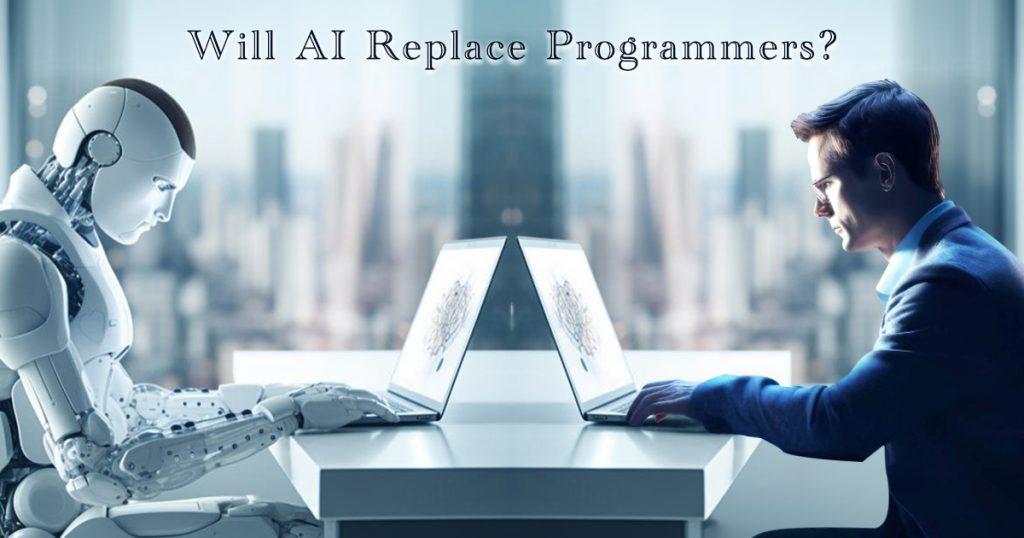As artificial intelligence (AI) continues to advance, there’s a lot of talk about how it might change different jobs. One profession getting a lot of attention is programming. Many people wonder if AI will eventually take over the role of programmers. To answer this, we need to look at what AI can do now, what it might be able to do in the future, and how it could affect the work of programmers.
The Current State of AI in Programming
AI has already achieved significant advances in software development. From automated code generation tools to sophisticated debugging assistants, AI is proving to be a valuable asset for programmers. Tools like GitHub Copilot and OpenAI’s Codex may recommend code snippets, automate repetitive chores, and even construct full functions from natural language descriptions.
AI Tools for Code Generation
- Code Autocompletion: AI-powered code autocompletion can predict and suggest code as programmers type. This functionality speeds up coding and reduces errors.
- Code Review and Error Detection: AI tools may scan code for potential flaws and make ideas for enhancements. These technologies contribute to code quality and can greatly minimize the time spent on manual code reviews.
- Automated Documentation: AI can generate documentation based on code comments and structure, making it easier for developers to maintain and understand their code.
While these tools are impressive, they are still limited in their scope. They operate within set boundaries and require human intervention to assure accuracy and efficacy.
The Limitations of AI in Programming
AI has brought significant advancements to programming, but it still has several limitations:
- Limited problem understanding: AI can create code based on patterns it finds in data, but it often doesn’t fully understand the programming problem. This can result in solutions that don’t fit the specific needs or situation.
- Prone to errors: AI tools can generate code with mistakes or bugs. They might miss subtle problems or fail to ensure the code works well, so human review and corrections are often needed.
- Lacks creativity: AI usually follows known patterns and algorithms. It may have difficulty with tasks that require creative or unique solutions beyond what it has been trained on.
- Dependence on quality data: AI works best with high-quality data. If the training data is incomplete or biased, the AI’s output can also be flawed or biased.
- Struggles with complex logic: AI can handle simple tasks and logic, but it may have trouble with complex problems that need deep understanding and advanced problem-solving skills.
- Lacks Understanding of User Intent: AI tools often don’t understand the user’s specific needs or goals. They create code based on patterns rather than a clear understanding of what the user wants.
- Challenges with unstructured problems: AI may not do well with coding challenges that don’t follow known patterns or structures.
- Ethical and security issues: AI-generated code may not always adhere to best practices for security and ethics, so human oversight is needed to ensure these standards are met.
- Lack of Context Awareness: AI might not fully understand the broader context in which the code will be used, which can lead to solutions that don’t fit the overall project goals or constraints.
- Limited documentation and explanation: AI-generated code may not come with enough documentation or explanations, making it harder for developers to understand, maintain, or modify the code effectively.
These limitations underscore the importance of human involvement in programming, even as AI tools become more sophisticated.
Will AI replace programmers?
As AI technology gets better, it helps with many programming tasks, but it’s not likely to replace human programmers, software engineers, or coders anytime soon. Instead, AI will be a helpful tool that automates routine tasks and supports these professionals in their work.
People often wonder if AI will take over the role of software engineers. The answer is that while AI can help with some tasks, software engineers will still be needed for jobs that require creativity, critical thinking, and understanding complex situations.
Similarly, when considering whether AI can replace software developers, it’s clear that these professionals will remain essential. As AI advances, software developers and coders may focus more on strategic and creative tasks, while AI takes care of more repetitive work.
While AI will greatly improve the programming field by automating some tasks and boosting efficiency, it is not expected to fully replace software engineers, developers, or coders. Instead, AI will work alongside human experts, helping them focus on more innovative and complex challenges.
Preparing for the Future: What Programmers Should Know
As AI continues to evolve, it still can’t replace coders. However, professionals should consider adapting their skills and roles to stay relevant in an AI-driven world. Here are some strategies to prepare for the future:
- Embrace AI as a Tool: Rather than seeing AI as a threat, programmers should embrace it as a tool to improve their work. Learning how to use AI-powered coding tools effectively can increase productivity and reduce the time spent on repetitive tasks.
- Focus on Soft Skills: Soft skills, such as communication, teamwork, and problem-solving, will become even more valuable as AI takes over routine tasks. Programmers should develop these skills to complement their technical expertise and enhance their roles within teams.
- Stay Informed About AI Developments: Staying up to date on AI breakthroughs can help programmers understand how these technologies may affect their work. Staying informed will allow them to adapt to new tools and strategies that develop.
Still, AI Can’t Replace Human Programmers
AI is getting better at programming, but it won’t replace human programmers completely. It can help with easy tasks and find mistakes, but it still needs humans to think creatively and solve tough problems. So, programmers should learn to use AI as a tool and keep improving their skills to stay useful in the future.
